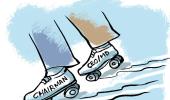'We don't expect any immediate impact on salaried jobs.'

"There may be significant job losses in the organised sector only if the disruption spills over to the next few quarters and we witness sizeable demand contraction,"Sankar Chakraborti, CEO, Acuite Ratings and Research, tells Prasanna D Zore/Rediff.com.
"In the near term, the effect will be clearly more on contract jobs and daily wage earners; the lockdown has already led to the loss of income and possible job losses in the unorganised sector. If the manufacturing sector revives within the next few months, some of these job losses can be reversed," he says.
Your report estimates that India is likely to lose $4.6 billion every day because of the nationwide lockdown. Could you tell us how you arrived at this number?
The estimate is based on the daily loss approach and incorporates the differential between the estimated and potential output in a 'business as usual' scenario with a 5 per cent growth assumption.
The methodology is driven by a model that considers the differential impact of the COVID-19 lockdown on the various segments of the economy.
What is your assessment of the loss to the economy for the financial year 2020-2021 given the extension of lockdown?
Every single day of lockdown costs the economy $4.6 billion and the ongoing lockdown will lead to economic losses of around $100 billion.
Clearly, an extension of the lockdown will lead to larger losses and prolonged impact on the economy.
We estimate that another 15-day lockdown may lead Q1 FY21 GDP to contract in double digits which in turn will further lower our FY21 growth forecast below 2.6 per cent.
Which sectors of the economy would face the major brunt of the economic standstill? Why?
Leisure, hospitality, transport, retail, and tourism related sectors have been severely impacted and importantly, will continue to remain under demand contraction for a longer time as people will generally abstain from social activities and public gatherings, even in the months that follow.
We also believe that there will be a substantial impact on banking and financial services, particularly MFIs and wholesale NBFCs since disbursement and collection activities have almost come to a standstill.
Which sectors do you think will bounce back quickly once the lockdown is lifted? Why?
Core sectors of the economy will be the first ones to bounce back simply because production in the core sector is the key to economic revival and sustainability.
The sectors such as steel, cement, coal, power, and mining are currently at very low capacity utilisation and should be the first ones to step up post lockdown.
Also, the channel inventory levels in the FMCG sector are at very low levels as reflected in the shortage of quite a few necessities and we would expect the FMCG goods manufacturers to ramp up production quickly.
The linked sectors such as logistics, transport, and infrastructure would follow closely.
What will be the consequences of the lockdown on the income and employment of India's middle class and the organised labour?
What will be its impact on the workers in the unorganised sector?
The impact will be clearer once we are in a position to assess the extent of economic lockdown and disruption.
We don't expect any immediate impact on salaried jobs as the corporates may not opt for downsizing right away.
There may be significant job losses in the organised sector only if the disruption spills over to the next few quarters and we witness sizeable demand contraction.
However, a significant part of the Indian labour force is unorganised and most people have no work contract. Niti Aayog in 2018 estimated that 85 per cent of the country's workers are in the informal sector.
In the near term, the effect will be clearly more on contract jobs and daily wage earners; the lockdown has already led to the loss of income and possible job losses in the unorganised sector.
If the manufacturing sector revives within the next few months, some of these job losses can be reversed.
How helpful will be the fiscal package of Rs 3.4 lakh crore and monetary stimulus of Rs 1.70 lakh crore announced by Finance Minister Nirmala Sitharaman and RBI Governor Shaktikanta Das in ameliorating the headwinds facing the economy?
Whatever resources the government can make available at this time is welcome given the fact that public expenditure is the only active variable in the entire aggregate demand function.
While these packages seem smaller than what other countries have done, the intent of the government has been to address the food security needs of the vulnerable segments initially.
We believe that the government wants to do its homework well and will come up with specific packages over the coming days.
The RBI has already done its part in setting the base for higher public borrowings (including deficit financing through the central bank in this difficult time) and facilitating liquidity movement across the system.
Careful fiscal-monetary coordination is, therefore, the key at this juncture.
What kind of measures do you think will the government have to announce in coming days to revive growth, employment, and earnings of corporate India?
Given the weakness in the economy aggravated by the COVID-19 lockdown, the government would have to work broadly within the fiscal constraints and may not want to risk any impact on the sovereign rating at this juncture.
We expect the government to take some measures in specific sectors where the extent of business disruption is very severe and there is a likely loss of employment in the near future.
These measures may be in the form of tax concessions or special dispensation for loan restructuring.










